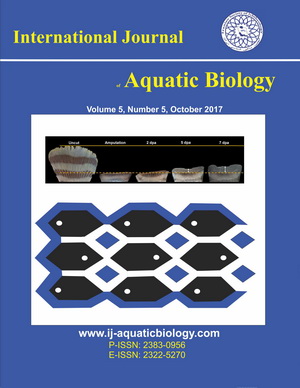Effect of Hyssopus officinalis extract dietary supplementation on serological parameters, growth indices, and survival of common carp (Cyprinus carpio) against Aeromonas hydrophila
The hyssop (Hyssopus officinalis) is known as a medicinal plant with antimicrobial and antioxidant properties. Despite a long history of medicinal use of H. officinalis, very few studies have been reported on the effect of H. officinalis on fish. Thus, the present study tried to investigate the effects of H. officinalis extract as a food supplement on serological parameters, growth indices, and survival of common carp (Cyprinus carpio) against Aeromonas hydrophila. For this purpose, the fish were divided into four treatments and fed with concentrations of 0, 0.250, 500, and 750 mg/kg H. officinalis extract in the diet for 60 days. The results revealed that the growth indices, including weight gain, length gain, specific growth rate (SGR), and food conversion ratio (FCR) in the treatments supplemented with H. officinalis extract, have no significant difference compared to the control treatment. Serological analysis showed that total protein increased in the treatments supplemented with H. officinalis extract, which was signi?cantly different in 500 and 750 mg/kg H. officinalis extract compared to the other treatments. Immunoglobulin signi?cantly increased in 750 mg/kg H. officinalis extract compared to the other treatments. There was no significant difference in the amounts of albumin, glucose, cortisol, cholesterol, triglyceride, creatinine, urea, aspartate aminotransferase (AST), alanine aminotransferase (ALT), alkaline phosphatase (ALP), lipase, and amylase of all treatments (P>0.05). Total antioxidant capacity (TAC) significantly increased in the treatment containing H. officinalis extract. Serum malondialdehyde (MDA) decreased in the treatments supplemented with H. officinalis extract. The lowest MDA was observed in 750 mg/kg H. officinalis extract, which was significantly different from other treatments. Relative survival percentage (RSP) against A. hydrophila increased in the treatments fed with H. officinalis extract. The highest RSP was observed in 750 mg/kg H. officinalis extract treatment. It can be concluded that dietary H. officinalis extract had a proper effect on immune system stimulation, antioxidant capacity, and resistance against A. hydrophila in the studied fish.
Downloads
Abdel-Tawwab M., Mousa M.A., Ahmad M.H., Sakr S.F. (2007). The use of calcium pre-exposure as a protective agent against environmental copper toxicity for juvenile Nile tilapia, Oreochromis niloticus (L.). Aquaculture, 264(1-4): 236-246.
Adel M., Caipang C.M.A., Dawood M.A. (2017). Immunological responses and disease resistance of rainbow trout (Oncorhynchus mykiss) juveniles following dietary administration of stinging nettle (Urtica dioica). Fish and Shellfish Immunology, 71: 230-238.
Amirkhani N., Firouzbakhsh F. (2015). Protective effects of basil (Ocimum basilicum) ethanolic extract supplementation diets against experimental Aeromonas hydrophila infection in common carp (Cyprinus carpio). Aquaculture Research, 46(3): 716-724.
Alinezhad H., Azimi R., Zare M., Ebrahimzadeh M.A., Eslami S., Nabavi S.F., Nabavi S.M. (2013). Antioxidant and antihemolytic activities of ethanolic extract of flowers, leaves, and stems of Hyssopus officinalis L. Var. angustifolius. International Journal of Food Properties, 16(5): 1169-1178.
Amar E.C., Kiron V., Satoh S., Watanabe T. (2004). Enhancement of innate immunity in rainbow trout (Oncorhynchus mykiss Walbaum) associated with dietary intake of carotenoids from natural products. Fish and Shellfish Immunology, 16(4): 527-537.
Baba E., Acar Ü., Y?lmaz S., Zemheri F., Ergün S. (2018). Dietary olive leaf (Olea europea L.) extract alters some immune gene expression levels and disease resistance to Yersinia ruckeri infection in rainbow trout Oncorhynchus mykiss. Fish and Shellfish Immunology, 79: 28-33.
Banaee M., Sureda A., Mirvaghefi A.R., Rafei G.R. (2011). Effects of long-term silymarin oral supplementation on the blood biochemical profile of rainbow trout (Oncorhynchus mykiss). Fish Physiology and Biochemistry, 37: 885-896.
Bello O.S., Olaifa F.E., Emikpe B.O., Ogunbanwo S.T. (2012). The effect of walnut (Tetracarpidium conophorum) leaf and onion (Allium cepa) bulb residues on the growth performance and nutrient utilization of Clarias gariepinus juveniles. Agricultural Science, 4: 205-213.
Etminan P.S., Jafarian Dehkordi M., Karimi Dehkordi M. (2021). The effects of hyssop hydroalcoholic extract on the serum biochemical factors of rats. Journal of Medicinal Herbs, 12(3): 23-29.
Fathiazad F., Hamedeyazdan S. (2011). A review on Hyssopus officinalis L.: Composition and biological activities. African Journal of Pharmacy and Pharmacology, 5(17): 1959-1966.
Fathiazad F., Mazandarani M., Hamedeyazdan S. (2011). Phytochemical analysis and antioxidant activity of Hyssopus officinalis L. from Iran. Advanced Pharmaceutical Bulletin, 1(2): 63.
Hatipo?lu G., Sökmen M., Bekta? E., Daferera D., Sökmen A., Demir E., ?ahin H. (2013). Automated and standard extraction of antioxidant phenolic compounds of Hyssopus officinalis L. ssp. angustifolius. Industrial Crops and Products, 43: 427-433.
Hernández Arias A., Romero A., Gonzalez-Stegmaier R., Dantagnan Dantagnan P. (2021). The effects of supplemented diets with a phytopharmaceutical preparation from herbal and macroalgal origin on disease resistance in rainbow trout against Piscirickettsia salmonis. Aquaculture, 1(454): 109-17.
Jagruthi C., Yogeshwari G., Anbazahan S.M., Mari L.S.S., Arockiaraj J., Mariappan P., Sudhakar G.R.L., Balasundaram C., Harikrishnan R. (2014). Effect of dietary astaxanthin against Aeromonas hydrophila infection in common carp, Cyprinus carpio. Fish and Shellfish Immunology, 41(2): 674-680.
Kazazi H., Rezaei K., Ghotb-Sharif S.J., Emam-Djomeh Z., Yamini Y. (2007). Supercritical fluid extraction of flavors and fragrances from Hyssopus officinalis L. cultivated in Iran. Food Chemistry, 105(2): 805-811.
Kordali S., Cakir A., Mavi A., Kilic H., Yildirim A. (2005). Screening of chemical composition and antifungal and antioxidant activities of the essential oils from three Turkish Artemisia species. Journal of Agricultural and Food Chemistry, 53(5): 1408-1416.
Lee J.H., Felipe P., Yang Y.H., Kim M.Y., Kwon O.Y., Sok D.E., Kim H.C., Kim M.R. (2009). Effects of dietary supplementation with red-pigmented leafy lettuce (Lactuca sativa) on lipid profiles and antioxidant status in C57BL/6J mice fed a high-fat high-cholesterol diet. British Journal of Nutrition, 101(8): 246-1254.
Li M., Zhu X., Tian J., Liu M., Wang G. (2019). Dietary flavonoids from Allium mongolicum Regel promotes growth, improves immune, antioxidant status, immune-related signaling molecules and disease resistance in juvenile northern snakehead fish (Channa argus). Aquaculture, 501: 473-481.
Liu B., Xie J., Ge X., Xu P., Miao L., Zhou Q., Pan L., Chen R. (2012). Comparison study of the effects of anthraquinone extract and emodin from Rheum officinale Bail on the physiological response, disease resistance of Megalobrama amblycephala under high temperature stress. Turkish Journal of Fisheries and Aquatic Sciences, 12(4).
Martínez-Álvarez R.M., Morales A.E., Sanz A. (2005). Antioxidant defenses in fish: biotic and abiotic factors. Reviews in Fish Biology and Fisheries, 15: 75-88.
Miyazaki H., Matsuura H., Yanagiya C., Mizutani J., Tsuji M., Ishihara C. (2003). Inhibitory effects of Hyssop (Hyssopus officinalis) extracts on intestinal ?-glncosidase activity and postprandial hyperglycemia. Journal of Nutritional Science and Vitaminology, 49(5): 346-349.
Oliva?Teles A. (2012). Nutrition and health of aquaculture fish. Journal of Fish Diseases, 35(2): 83-108.
Omidzahir S., Fallah F. (2023). Effect of dietary Ganoderma lucidum extract on growth performance, blood biochemical parameters, and antioxidant status in juvenile beluga (Huso huso). Iranian Journal of Fisheries Sciences, 22(3): 713-725.
Oropesa A.L., García-Cambero J.P., Soler F. (2009). Glutathione and malondialdehyde levels in common carp after exposure to simazine. Environmental Toxicology and Pharmacology, 27(1): 30-38.
Shalaby A.M., Khattab Y.A., Abdel Rahman A.M. (2006). Effects of Garlic (Allium sativum) and chloramphenicol on growth performance, physiological parameters and survival of Nile tilapia (Oreochromis niloticus). Journal of Venomous Animals and Toxins including Tropical Diseases, 12: 172-201.
Sharma A., Deo A.D., Riteshkumar S.T., Chanu T.I., Das A. (2010). Effect of Withania somnifera (L. Dunal) root as a feed additive on immunological parameters and disease resistance to Aeromonas hydrophila in Labeo rohita (Hamilton) fingerlings. Fish and Shellfish Immunology, 29(3): 508-512.
Tahir M., Rahman M.A., Khushtar M. (2022). Gastroprotective effect of Hyssopus officinalis L. leaves via reduction of oxidative stress in indomethacin-induced gastric ulcer in experimental rats. Drug and Chemical Toxicology, 45(1): 291-300.
Taleghani M., Hoseini S.M., Omidzahir S. (2019). The protective effect of Damask rose, Rosa damascena extract on the liver of Cyprinus carpio following zinc exposure. International Journal of Aquatic Biology, 7(5): 315-321.
Trichet V.V. (2010). Nutrition and immunity: an update. Aquaculture Research, 41(3): 356-372.
Vlase L., Benedec D., Hanganu D., Damian G., Csillag I., Sevastre B., Mot A.C., Silaghi-Dumitrescu R., Tilea I. (2014). Evaluation of antioxidant and antimicrobial activities and phenolic profile for Hyssopus officinalis, Ocimum basilicum and Teucrium chamaedrys. Molecules, 19(5): 5490-5507.
Xie J., Liu B., Zhou Q., Su Y., He Y., Pan L., Ge X., Xu P. (2008). Effects of anthraquinone extract from rhubarb Rheum officinale Bail on the crowding stress response and growth of common carp Cyprinus carpio var. Jian. Aquaculture, 281(1-4): 5-11.
Y?ld?z M., Ci?erci ?.H., Konuk M., Fidan A.F., Terzi H. (2009). Determination of genotoxic effects of copper sulphate and cobalt chloride in Allium cepa root cells by chromosome aberration and comet assays. Chemosphere, 75(7): 934-938.
Yousefi M., Hoseini S.M., Abtahi B., Vatnikov Y.A., Kulikov E.V., Rodionova N.Y. (2022). Effects of dietary methanolic extract of hyssop, Hyssopus officinalis, on growth performance, hepatic antioxidant, humoral and intestinal immunity, and intestinal bacteria of rainbow trout, Oncorhynchus mykiss. Frontiers in Marine Science, 9: 1026651.
Yu Z.L., Zhang J.G., Wang X.C., Chen J. (2008). Excessive Copper Induces the Production of ROS, which is Mediated by Phospholipase D, NADPH Oxidase and Antioxidant Systems. Journal of Integrative Plant Biology, 50(2): 157.
Copyright (c) 2025 International Journal of Aquatic Biology

This work is licensed under a Creative Commons Attribution 4.0 International License.








